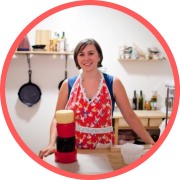I started with books, because I've always loved books. I landed a sales job in publishing, where I got to travel around the world.
I would go to Italy and London and Germany and Scandinavia, and I was getting excited about food. Somewhere along the line, I started tasting cheese.
I found myself going to cheese shops at home in New York, and hanging out and tasting cheese with the cheese mongers and talking about it. It was a deep study of cheese for me. It was fun and delicious, but I was also studying culture and studying history and geography–geology, land, and agriculture! I found myself learning as much about the world by exploring cheese as I did ever studying or learning in a more official atmosphere.
For years, I was sort of a maniac of keeping track of all the cheeses I would taste. Finally, I got to the point where I thought, "Okay, how can I keep learning more?" ...so I started making cheese at home. I started by experimenting. I would take the cheeses that I made to a friend who owned a local cheese shop. He would taste them, and we'd talk about how I could make them better. Finally, he said, "What are you doing with yourself? The cheese industry needs you. You need to work in cheese!" I'm very risk averse in the sense that I wasn't quite ready to give up a more traditional career path...but I ended up trying it.
I really, really loved the work. It was one thing to love the product, but it was another thing to love the work of running a business, retailing, and the whole human element of customer service and being a retailer wound up being something that I relished. Eventually, I took the plunge and quit my more traditional job to the chagrin and laughter of some family members.
I started managing cheese shops, and I got a little bit known for launching new cheese shops. I still made cheese, and I worked for a couple of cheesemakers along the way (in between store openings I managed sales for cheesemakers). Then, this year, I published a book called The Beginner's Guide to Cheesemaking. It encompasses everything I learned during the years when I was just starting out and doing all kinds of wacky cheesemaking in my apartment--including every disaster I ever had that I wished I'd been warned about.
My whole career has been about learning, but also about sharing that learning. In the sense of ministering to others, the most satisfying parts of my work in cheese have been building the knowledge base that I could then give to others and help people have their own “ah-ha” moments with cheese.
Cheese can be a transportive experience. If I can help someone emotionally and spiritually transport themselves to an Alpine mountain in Switzerland while standing in a bustling shop in Brooklyn, then I think that's a pretty good day.
My work has taught me that if you pursue what you're passionate about, it's going to be satisfying. There might not be a lot of money involved, but if you can swing it, follow that passion. I've had to learn how to maintain that extra-curricular love of something while also making it my life's work – that can be a challenge.
For most of my career, I've managed retail teams and staff, ranging from six people to 175 people. Real leadership is about empowering others to achieve success. Especially in the food industry, there are a lot of jobs that are not very empowering and that are kind of brutal.
I started a professional development group called Women in Cheese. We've been gathering for four years.I basically just create a forum, mostly in person, where women who work in the cheese industry gather together. It creates a space for people to develop mentoring relationships and to learn about new opportunities. We also eat a lot of cheese!
I think my enthusiasm, confidence, and ability to bring people together can all be traced back to Wellesley. The desire to make women's voices more heard and to bring women together carries through in everything that I do.
Take your ambitions and your interests and localize them as much as possible. Try to have as much of an impact on the people and the places you interact with in your daily life as possible.
I think that sometimes when we think of work and efforts on a global scale, we forget that it's really the daily interactions and the daily choices that we make that end up shaping the world.
Elena Santogade '04 is an American Cheese Society Certified Cheese Professional® and the author of The Beginner's Guide to Cheesemaking: Easy Recipes and Lessons to Make Your Own Handcrafted Cheeses.
Photo credit: A. Hinderaker




